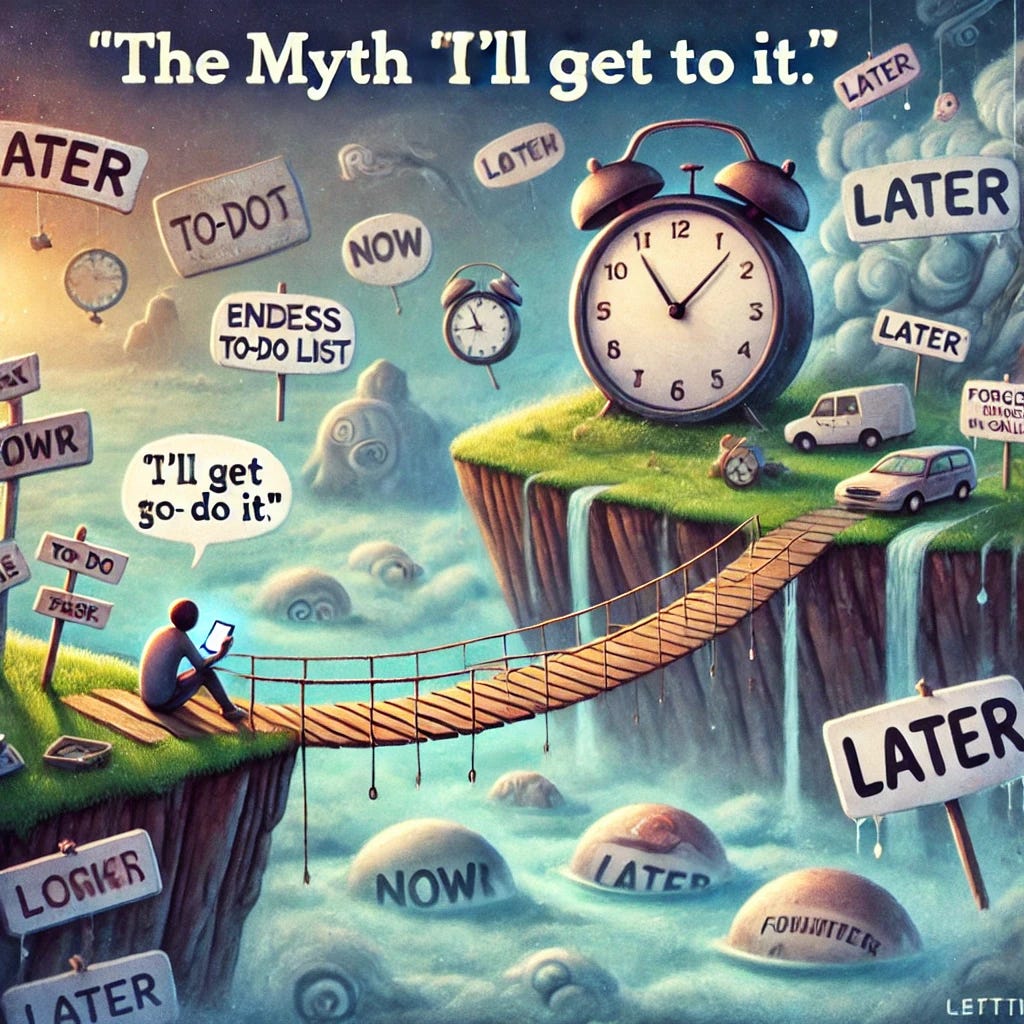From Chaos to Control: How to Master Time in a World That Won’t Stop Spinning
Because if time was money, we’d all be broke
Ever feel like time is playing a cruel game of hide-and-seek, and you’re always “it”? You wake up with the best intentions—today’s the day you conquer that to-do list—but by 11 AM, you’re knee-deep in emails, half a coffee down, and wondering where the morning went.
Managing time in today’s world feels like trying to herd cats. But don’t worry—you’re not alone, and you’re not doomed to chaos forever. Let’s figure out how to wrestle back control, one cleverly managed minute at a time.
The Myth of “I’ll Get to It”
First, let’s tackle the biggest lie we tell ourselves: “I’ll get to it later.”
Later is a mythical place where tasks go to die. It’s like Narnia, but without the magic wardrobe. If you’re constantly deferring things to this imaginary “later,” you’re setting yourself up for the dreaded productivity hangover—the overwhelming regret of having done nothing when you had the chance.
Solution: The 2-Minute Rule
If a task takes less than two minutes, do it immediately. No excuses. Whether it’s replying to a quick email, tidying your desk, or confirming your dentist appointment (seriously, they’re starting to think you’ve moved to another continent).
Step 1: The Airplane Analogy
You know how flight attendants always tell you to put on your oxygen mask before helping others? That’s time management in a nutshell. You can’t pour from an empty cup—or in this case, you can’t tick off tasks if you’re running on fumes.
How to Apply This to Your Day
Start your day with “you time.” Whether it’s journaling, meditating, or just enjoying a quiet cup of coffee, set the tone before the world starts demanding things.
Schedule breaks like appointments. If it’s on the calendar, it’s sacred.
Step 2: Tame Your Calendar
Your calendar should be a tool, not a tyrant. But let’s face it, most of us treat it like a cluttered junk drawer. Meetings, calls, and “maybe later” tasks are crammed in there until it’s impossible to breathe.
Make Your Calendar Work for You:
Time Block Like a Boss:
Dedicate chunks of your day to specific activities. Morning for creative work, afternoons for admin tasks, and evenings for Netflix (let’s not kid ourselves).The Power of No:
Every “yes” to someone else’s request is a “no” to your own priorities. Practice saying no politely but firmly. If that feels too harsh, blame it on “a packed schedule” (we’ve all done it).
Step 3: Eat the Elephant
No, not literally. (Although if you’re in the culinary world, more power to you.) This is about tackling big, overwhelming tasks.
The phrase “How do you eat an elephant? One bite at a time” is the key here. Break your colossal projects into smaller, bite-sized chunks that don’t feel as intimidating.
Practical Example:
Say you’re writing a report.
Day 1: Outline the sections.
Day 2: Draft the introduction.
Day 3: Add data and visuals.
Day 4: Polish and proofread.
By the end of the week, you’re done—and you didn’t even break a sweat.
Step 4: Avoid the Ping-Pong Trap
Let’s talk distractions. Email notifications, Slack pings, and social media can turn your day into a never-ending game of digital ping-pong. The constant back-and-forth kills your focus and stretches a 2-hour task into a 5-hour ordeal.
How to Win the Game:
Turn off notifications during deep work.
Use the Pomodoro Technique: 25 minutes of focus, 5 minutes of guilt-free scrolling (but set a timer or you’ll spiral into a TikTok rabbit hole).
Batch similar tasks together. Check emails twice a day instead of every 10 minutes.
Step 5: The “Ugly Baby” Approach
Here’s a weird analogy for you: every task is like an ugly baby. Stick with me. At first, it’s not very appealing, and you don’t want to deal with it. But once you nurture it (aka start working on it), you see its potential and start to appreciate it.
The hardest part of any task is starting. Once you do, momentum kicks in. So, stop overthinking and dive in. Your ugly baby (project) will thank you.
Step 6: Celebrate the Small Stuff
Let’s be honest, life isn’t all grand gestures and big wins. Sometimes, victory is as simple as clearing out your email inbox or finally sorting the junk drawer.
Why Small Wins Matter:
They create momentum. Momentum builds confidence. Confidence makes you feel like you can conquer anything—including that 47-slide PowerPoint presentation your boss just assigned.
Tools to Help You Stay on Track
Trello or Asana: For organizing projects and tasks.
Google Calendar: For time-blocking and reminders.
Notion: For all-in-one productivity and note-taking.
A Big, Fat Notebook: Because sometimes, pen and paper are all you need.
The Reality of Time Management
Here’s the thing: you’ll never have “enough” time. The world isn’t slowing down for you, and your to-do list isn’t going to magically shrink overnight. But by focusing on what matters, breaking tasks into manageable chunks, and giving yourself permission to breathe, you can turn chaos into control.
Time isn’t the enemy—it’s a tool. Use it wisely, and it will work for you, not against you.
Sign Off
So, what’s your first move? A 2-minute task? A time-blocked afternoon? Or maybe just putting on your oxygen mask (aka taking a break)? Whatever it is, start now. The clock’s ticking, but you’ve got this.





